Mental Health Nursing: Ethical Considerations in Suicide Prevention
VerifiedAdded on 2023/06/05
|5
|987
|182
Case Study
AI Summary
This case study explores the mental health challenges faced by an individual named Chung, focusing on urgent risk areas such as suicide and anxiety. The analysis identifies suicide as the most pressing concern due to Chung's suicidal thoughts and behaviors, suggesting Cognitive Behavior Therapy (CBT) as an appropriate nursing intervention. The study also addresses Chung's anxiety, recommending Dialectical Behavior Therapy (DBT) to help regulate emotions and alter perceptions. Furthermore, it emphasizes the ethical considerations for nurses and midwives, particularly confidentiality and patient independence, in accordance with the Nursing and Midwifery Board association (NMBA) standards. The paper concludes by referencing relevant literature to support the suggested interventions and ethical guidelines.
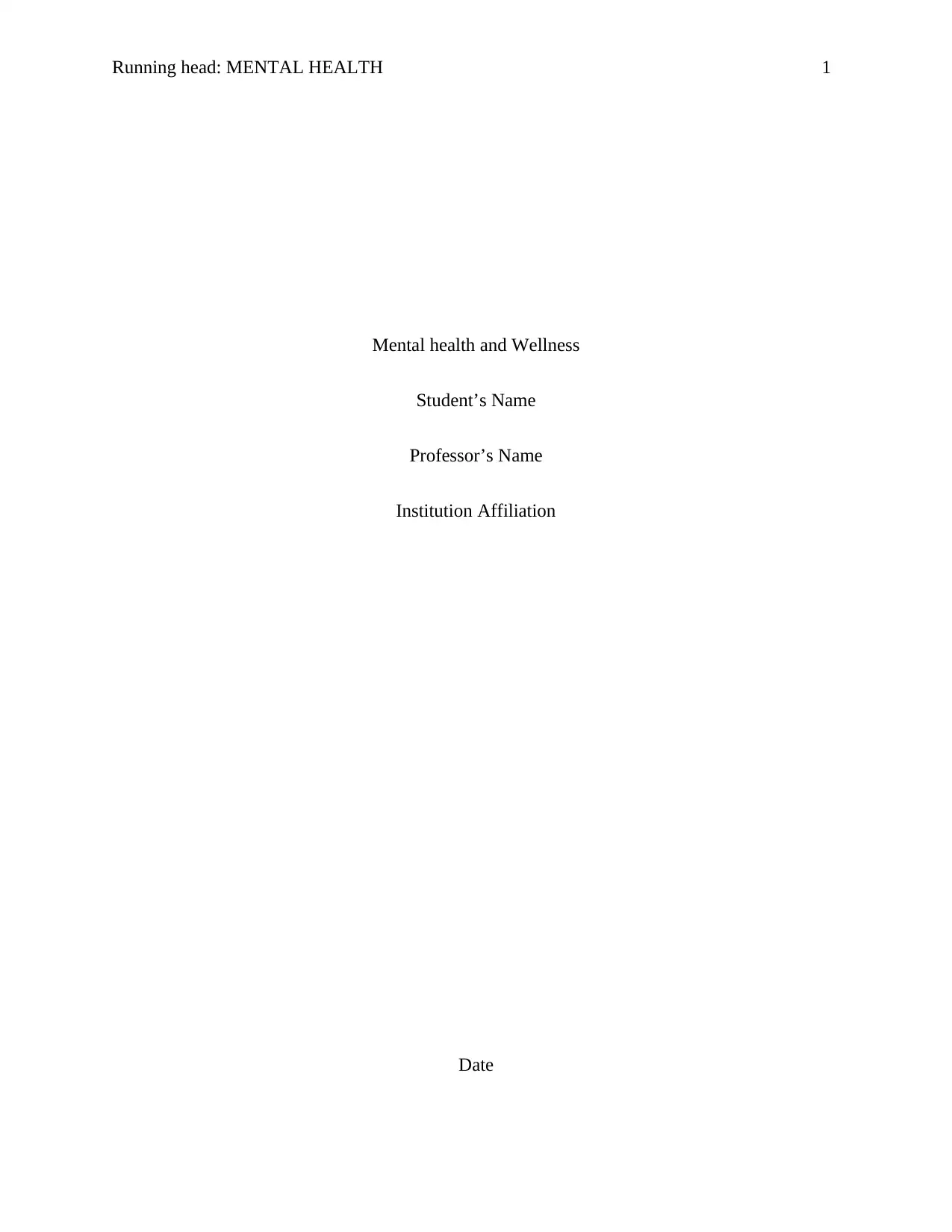
Running head: MENTAL HEALTH 1
Mental health and Wellness
Student’s Name
Professor’s Name
Institution Affiliation
Date
Mental health and Wellness
Student’s Name
Professor’s Name
Institution Affiliation
Date
Paraphrase This Document
Need a fresh take? Get an instant paraphrase of this document with our AI Paraphraser
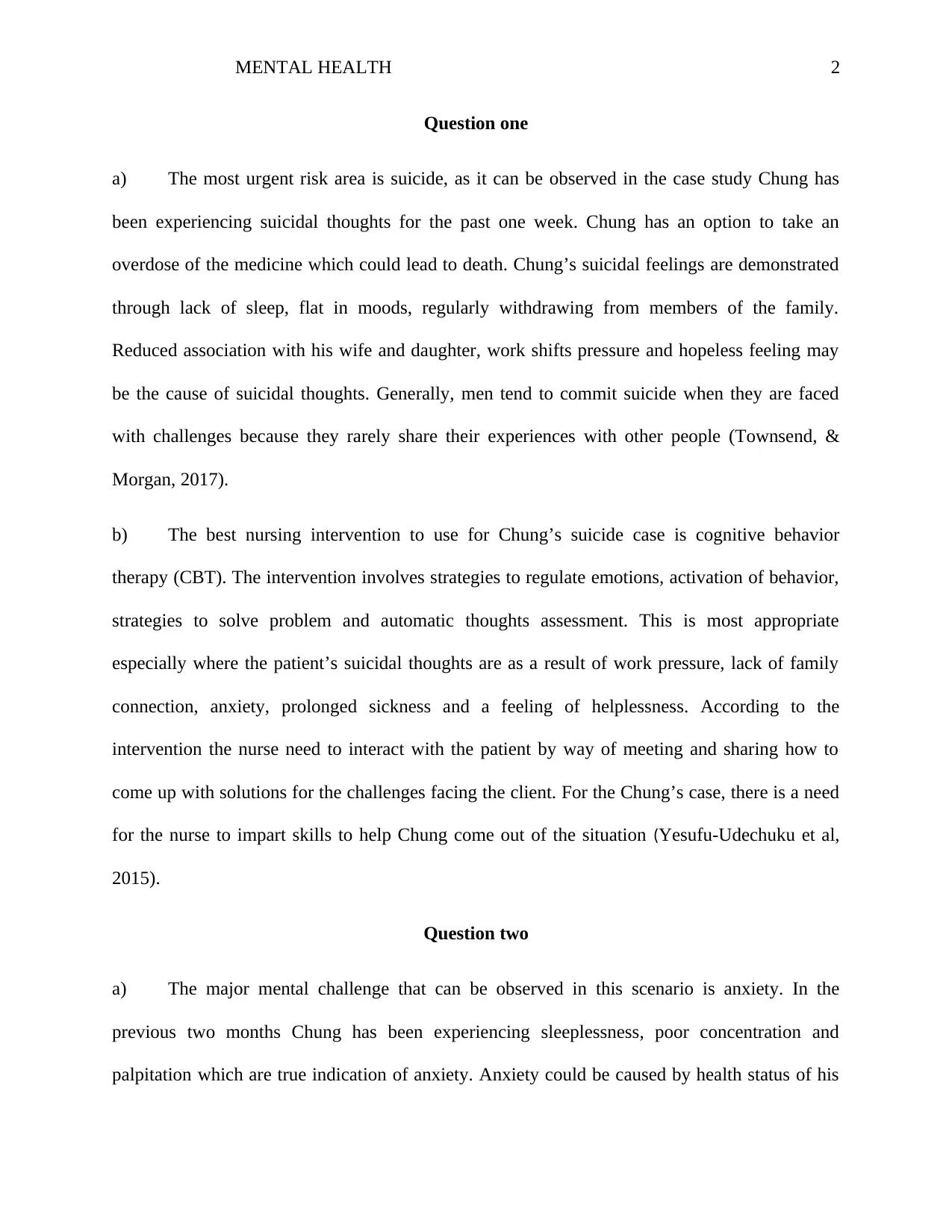
MENTAL HEALTH 2
Question one
a) The most urgent risk area is suicide, as it can be observed in the case study Chung has
been experiencing suicidal thoughts for the past one week. Chung has an option to take an
overdose of the medicine which could lead to death. Chung’s suicidal feelings are demonstrated
through lack of sleep, flat in moods, regularly withdrawing from members of the family.
Reduced association with his wife and daughter, work shifts pressure and hopeless feeling may
be the cause of suicidal thoughts. Generally, men tend to commit suicide when they are faced
with challenges because they rarely share their experiences with other people (Townsend, &
Morgan, 2017).
b) The best nursing intervention to use for Chung’s suicide case is cognitive behavior
therapy (CBT). The intervention involves strategies to regulate emotions, activation of behavior,
strategies to solve problem and automatic thoughts assessment. This is most appropriate
especially where the patient’s suicidal thoughts are as a result of work pressure, lack of family
connection, anxiety, prolonged sickness and a feeling of helplessness. According to the
intervention the nurse need to interact with the patient by way of meeting and sharing how to
come up with solutions for the challenges facing the client. For the Chung’s case, there is a need
for the nurse to impart skills to help Chung come out of the situation (Yesufu-Udechuku et al,
2015).
Question two
a) The major mental challenge that can be observed in this scenario is anxiety. In the
previous two months Chung has been experiencing sleeplessness, poor concentration and
palpitation which are true indication of anxiety. Anxiety could be caused by health status of his
Question one
a) The most urgent risk area is suicide, as it can be observed in the case study Chung has
been experiencing suicidal thoughts for the past one week. Chung has an option to take an
overdose of the medicine which could lead to death. Chung’s suicidal feelings are demonstrated
through lack of sleep, flat in moods, regularly withdrawing from members of the family.
Reduced association with his wife and daughter, work shifts pressure and hopeless feeling may
be the cause of suicidal thoughts. Generally, men tend to commit suicide when they are faced
with challenges because they rarely share their experiences with other people (Townsend, &
Morgan, 2017).
b) The best nursing intervention to use for Chung’s suicide case is cognitive behavior
therapy (CBT). The intervention involves strategies to regulate emotions, activation of behavior,
strategies to solve problem and automatic thoughts assessment. This is most appropriate
especially where the patient’s suicidal thoughts are as a result of work pressure, lack of family
connection, anxiety, prolonged sickness and a feeling of helplessness. According to the
intervention the nurse need to interact with the patient by way of meeting and sharing how to
come up with solutions for the challenges facing the client. For the Chung’s case, there is a need
for the nurse to impart skills to help Chung come out of the situation (Yesufu-Udechuku et al,
2015).
Question two
a) The major mental challenge that can be observed in this scenario is anxiety. In the
previous two months Chung has been experiencing sleeplessness, poor concentration and
palpitation which are true indication of anxiety. Anxiety could be caused by health status of his
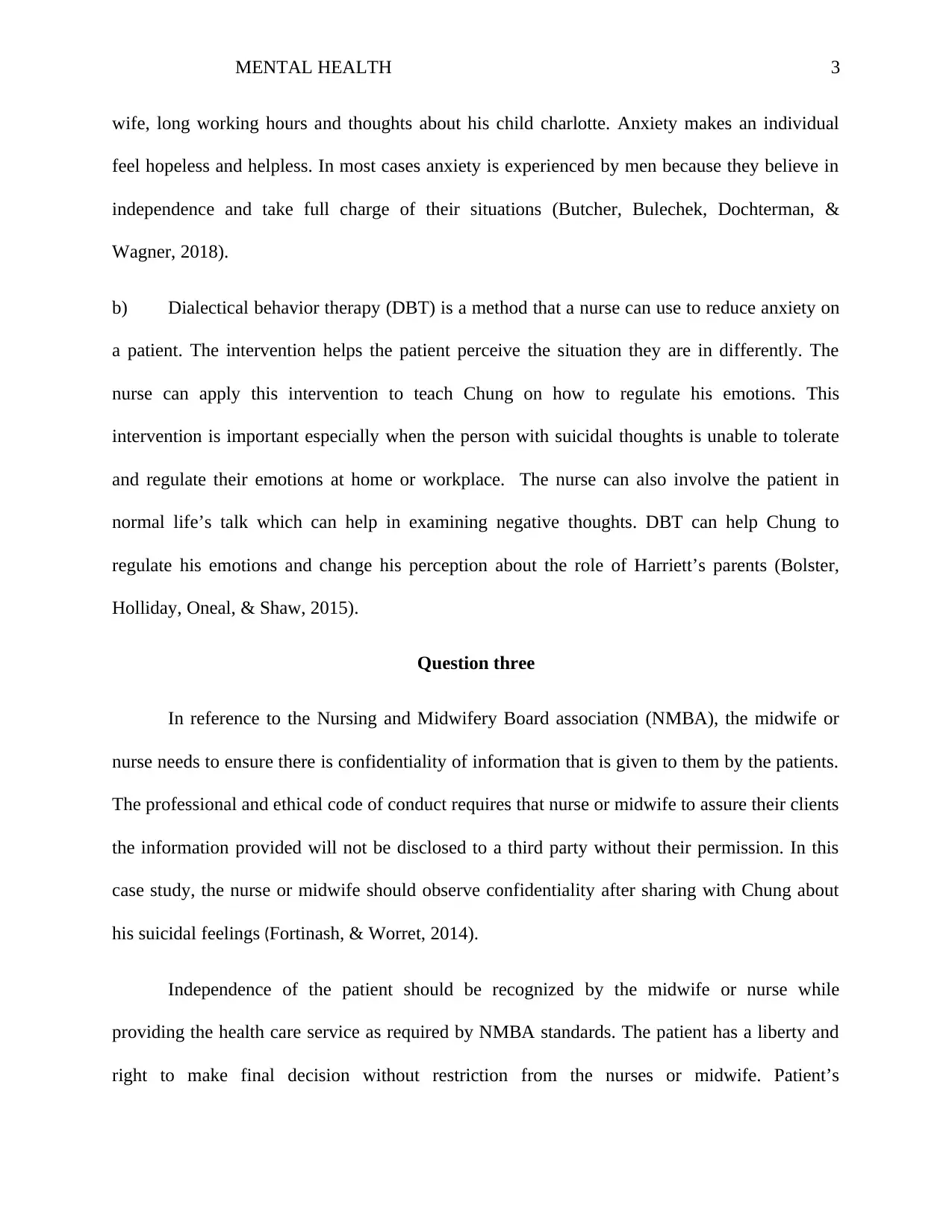
MENTAL HEALTH 3
wife, long working hours and thoughts about his child charlotte. Anxiety makes an individual
feel hopeless and helpless. In most cases anxiety is experienced by men because they believe in
independence and take full charge of their situations (Butcher, Bulechek, Dochterman, &
Wagner, 2018).
b) Dialectical behavior therapy (DBT) is a method that a nurse can use to reduce anxiety on
a patient. The intervention helps the patient perceive the situation they are in differently. The
nurse can apply this intervention to teach Chung on how to regulate his emotions. This
intervention is important especially when the person with suicidal thoughts is unable to tolerate
and regulate their emotions at home or workplace. The nurse can also involve the patient in
normal life’s talk which can help in examining negative thoughts. DBT can help Chung to
regulate his emotions and change his perception about the role of Harriett’s parents (Bolster,
Holliday, Oneal, & Shaw, 2015).
Question three
In reference to the Nursing and Midwifery Board association (NMBA), the midwife or
nurse needs to ensure there is confidentiality of information that is given to them by the patients.
The professional and ethical code of conduct requires that nurse or midwife to assure their clients
the information provided will not be disclosed to a third party without their permission. In this
case study, the nurse or midwife should observe confidentiality after sharing with Chung about
his suicidal feelings (Fortinash, & Worret, 2014).
Independence of the patient should be recognized by the midwife or nurse while
providing the health care service as required by NMBA standards. The patient has a liberty and
right to make final decision without restriction from the nurses or midwife. Patient’s
wife, long working hours and thoughts about his child charlotte. Anxiety makes an individual
feel hopeless and helpless. In most cases anxiety is experienced by men because they believe in
independence and take full charge of their situations (Butcher, Bulechek, Dochterman, &
Wagner, 2018).
b) Dialectical behavior therapy (DBT) is a method that a nurse can use to reduce anxiety on
a patient. The intervention helps the patient perceive the situation they are in differently. The
nurse can apply this intervention to teach Chung on how to regulate his emotions. This
intervention is important especially when the person with suicidal thoughts is unable to tolerate
and regulate their emotions at home or workplace. The nurse can also involve the patient in
normal life’s talk which can help in examining negative thoughts. DBT can help Chung to
regulate his emotions and change his perception about the role of Harriett’s parents (Bolster,
Holliday, Oneal, & Shaw, 2015).
Question three
In reference to the Nursing and Midwifery Board association (NMBA), the midwife or
nurse needs to ensure there is confidentiality of information that is given to them by the patients.
The professional and ethical code of conduct requires that nurse or midwife to assure their clients
the information provided will not be disclosed to a third party without their permission. In this
case study, the nurse or midwife should observe confidentiality after sharing with Chung about
his suicidal feelings (Fortinash, & Worret, 2014).
Independence of the patient should be recognized by the midwife or nurse while
providing the health care service as required by NMBA standards. The patient has a liberty and
right to make final decision without restriction from the nurses or midwife. Patient’s
⊘ This is a preview!⊘
Do you want full access?
Subscribe today to unlock all pages.

Trusted by 1+ million students worldwide
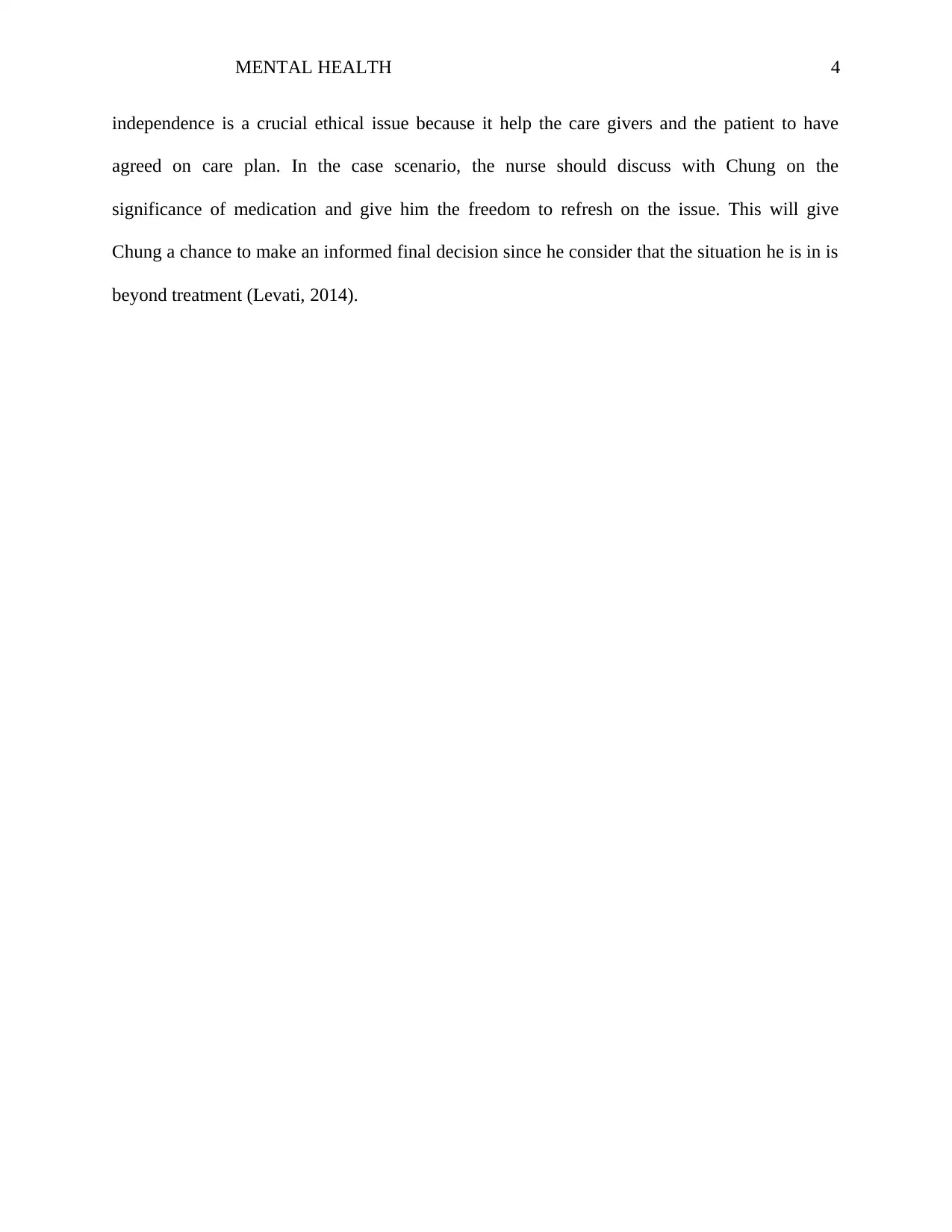
MENTAL HEALTH 4
independence is a crucial ethical issue because it help the care givers and the patient to have
agreed on care plan. In the case scenario, the nurse should discuss with Chung on the
significance of medication and give him the freedom to refresh on the issue. This will give
Chung a chance to make an informed final decision since he consider that the situation he is in is
beyond treatment (Levati, 2014).
independence is a crucial ethical issue because it help the care givers and the patient to have
agreed on care plan. In the case scenario, the nurse should discuss with Chung on the
significance of medication and give him the freedom to refresh on the issue. This will give
Chung a chance to make an informed final decision since he consider that the situation he is in is
beyond treatment (Levati, 2014).
Paraphrase This Document
Need a fresh take? Get an instant paraphrase of this document with our AI Paraphraser
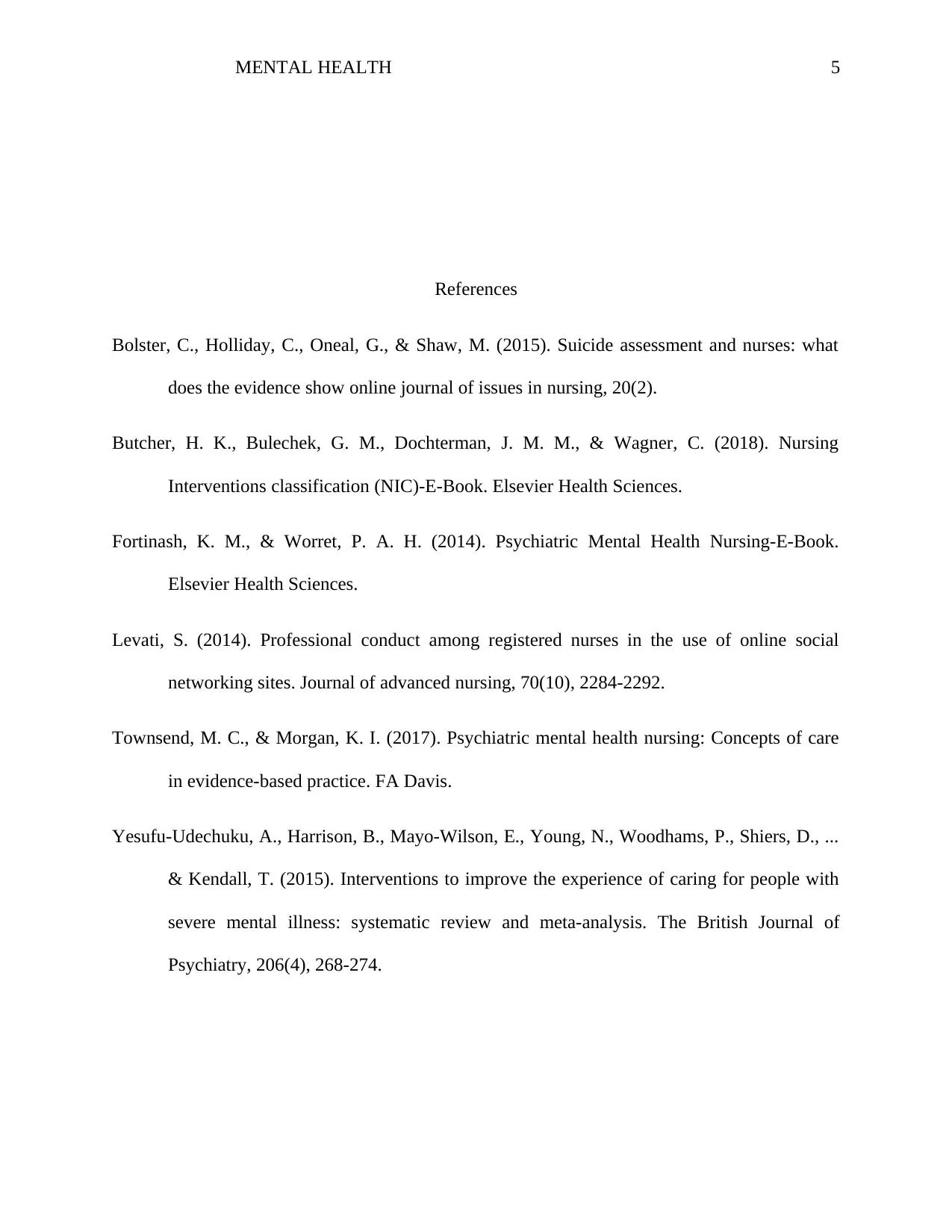
MENTAL HEALTH 5
References
Bolster, C., Holliday, C., Oneal, G., & Shaw, M. (2015). Suicide assessment and nurses: what
does the evidence show online journal of issues in nursing, 20(2).
Butcher, H. K., Bulechek, G. M., Dochterman, J. M. M., & Wagner, C. (2018). Nursing
Interventions classification (NIC)-E-Book. Elsevier Health Sciences.
Fortinash, K. M., & Worret, P. A. H. (2014). Psychiatric Mental Health Nursing-E-Book.
Elsevier Health Sciences.
Levati, S. (2014). Professional conduct among registered nurses in the use of online social
networking sites. Journal of advanced nursing, 70(10), 2284-2292.
Townsend, M. C., & Morgan, K. I. (2017). Psychiatric mental health nursing: Concepts of care
in evidence-based practice. FA Davis.
Yesufu-Udechuku, A., Harrison, B., Mayo-Wilson, E., Young, N., Woodhams, P., Shiers, D., ...
& Kendall, T. (2015). Interventions to improve the experience of caring for people with
severe mental illness: systematic review and meta-analysis. The British Journal of
Psychiatry, 206(4), 268-274.
References
Bolster, C., Holliday, C., Oneal, G., & Shaw, M. (2015). Suicide assessment and nurses: what
does the evidence show online journal of issues in nursing, 20(2).
Butcher, H. K., Bulechek, G. M., Dochterman, J. M. M., & Wagner, C. (2018). Nursing
Interventions classification (NIC)-E-Book. Elsevier Health Sciences.
Fortinash, K. M., & Worret, P. A. H. (2014). Psychiatric Mental Health Nursing-E-Book.
Elsevier Health Sciences.
Levati, S. (2014). Professional conduct among registered nurses in the use of online social
networking sites. Journal of advanced nursing, 70(10), 2284-2292.
Townsend, M. C., & Morgan, K. I. (2017). Psychiatric mental health nursing: Concepts of care
in evidence-based practice. FA Davis.
Yesufu-Udechuku, A., Harrison, B., Mayo-Wilson, E., Young, N., Woodhams, P., Shiers, D., ...
& Kendall, T. (2015). Interventions to improve the experience of caring for people with
severe mental illness: systematic review and meta-analysis. The British Journal of
Psychiatry, 206(4), 268-274.
1 out of 5
Related Documents
Your All-in-One AI-Powered Toolkit for Academic Success.
+13062052269
info@desklib.com
Available 24*7 on WhatsApp / Email
![[object Object]](/_next/static/media/star-bottom.7253800d.svg)
Unlock your academic potential
Copyright © 2020–2026 A2Z Services. All Rights Reserved. Developed and managed by ZUCOL.


